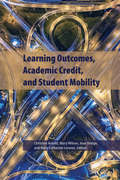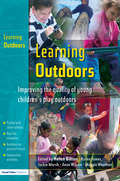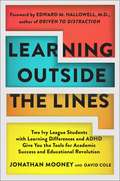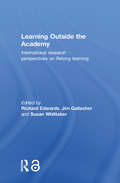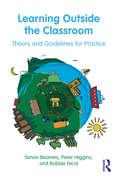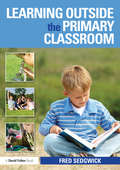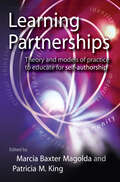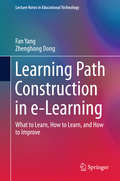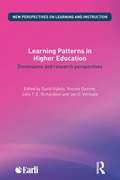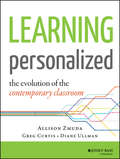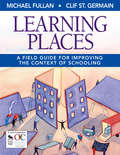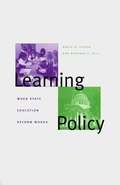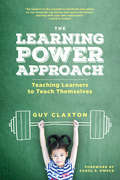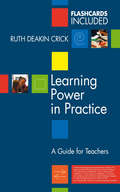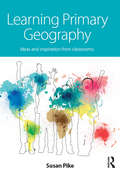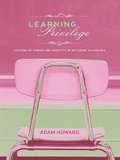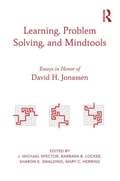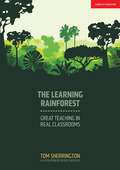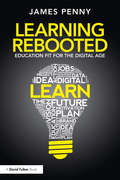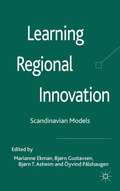- Table View
- List View
Learning Outcomes, Academic Credit and Student Mobility (Queen's Policy Studies Series #201)
by Christine Arnold, Mary Wilson, Jean Bridge, and Mary Catharine LennonThere is increasing interest in the use of learning outcomes in postsecondary education, and deliberations have surfaced with regard to their potential to serve as a tool for advancing credit transfer. Learning Outcomes, Academic Credit, and Student Mobility assesses the conceptual foundations, assumptions, and implications of using learning outcomes for the purposes of postsecondary credit transfer and student mobility. Through a critical review of current approaches to the use of learning outcomes across national and international jurisdictions, scholars and practitioners in postsecondary education provide a multivalent examination of their potential impacts in the unique context of Ontario and recommend future directions for the system. The collected works are the culmination of a multi-year study entitled Learning Outcomes for Transfer, funded by the Ontario Council on Articulation and Transfer. Contributions are authored by prominent international scholars across countries with significant outcomes-based experience and education reforms (South Africa, the United States, Australia, Europe, and the United Kingdom) and an Ontario research consortium comprising college and university experts working to advance student pathways.
Learning Outdoors: Improving the Quality of Young Children's Play Outdoors
by Maggie WoontonIt is now officially acknowledged that outdoor play is extremely important for young children's development and that a few old bikes and a climbing frame just will not do. This book shows how to develop an outdoor learning environment properly for young children and how adult supporters should behave in this space.This book offers examples of good
Learning Outside The Lines: Two Ivy League Students With Learning Disabilities And Adhd Give You The Tools F
by David Cole Edward M. Hallowell Jonathan MooneyLearning with YOUR purpose in mind -- not your parents', not your teacher's, not your school's Every day, your school, your teachers, and even your peers draw lines to measure and standardize intelligence. They decide what criteria make one person smart and another person stupid. They decide who will succeed and who will just get by. Perhaps you find yourself outside the norm, because you learn differently -- but, unlike your classmates, you have no system in place that consistently supports your ability and desire to learn. Simply put, you are considered lazy and stupid. You are expected to fail. Learning Outside the Lines is written by two such "academic failures" -- that is, two academic failures who graduated from Brown University at the top of their class. Jonathan Mooney and David Cole teach you how to take control of your education and find true success -- and they offer all the reasons why you should persevere. Witty, bold, and disarmingly honest, Learning Outside the Lines takes you on a journey toward personal empowerment and profound educational change, proving once again that rules sometimes need to be broken.
Learning Outside The Lines
by Edward M. Hallowell Jonathan Mooney David Coleoward personal empowerment and profound educational change, proving once again that rules sometimes need to be broken.
Learning Outside the Academy: International Research Perspectives on Lifelong Learning
by Richard Edwards Susan Whittaker Jim GallacherThis book weaves together different strands of research in the area of lifelong learning that concentrates particularly on learning in alternative settings and ways, such experiential learning and informal and community learning. Drawing upon international research, the book examines how these strands of research can contribute to each other. The contributions to this book are based on material presented at a conference at the Centre for Research in Lifelong Learning, UK, and they focus on research into key issues of policy and practice in lifelong learning. Establishing a wider framework for debate about the meaning and significance of lifelong learning, this timely and thought-provoking book provides practitioners in the field with a relevant and current discussion on some very important ideas about non-formal education.
Learning Outside the Classroom: Theory and Guidelines for Practice
by Simon Beames Robbie Nicol Pete HigginsLearning Outside the Classroom outlines theory and practice that will enable and encourage teachers to systematically and progressively incorporate meaningful outdoor learning opportunities into their daily teaching activities in a wide variety of environments and with diverse populations of pupils. This is the first textbook based around the curriculum for prospective and practising primary and secondary teachers and other outdoor educators. The principles and examples presented are intended to be adapted by teachers to suit the needs of their students in ways that draw upon content offered by the local landscape and its natural and built heritage. Although the focus of this book is ‘the real world’ beyond the classroom, it is also about good teaching — wherever it takes place. While there are chapters on practical issues such as risk-management and supervising groups outdoors, the chapters on curriculum, sustainability, curiosity, responsibility, and educational communities will serve as a valuable guide for anyone interested in applying educational theory to practice.
Learning Outside the Primary Classroom
by Fred Sedgwick"We believe that every young person should experience the world beyond the classroom as an essential part of learning and personal development, whatever their age, ability or circumstances. Learning outside the classroom is about raising achievement through an organised, powerful approach to learning in which direct experience is of prime importance." LOTC Initiative manifesto In Learning Outside the Primary Classroom, the educationalist and writer Fred Sedgwick explores in a practical way the many opportunities for intense learning that children and teachers can find outside the confines of the usual learning environment, the classroom. This original work is based on tried and tested methods from UK primary schools. The author draws on current concerns in the educational world regarding outdoor learning as exemplified by the eight sector Learning Outside the Classroom (LOtC) initiative (supported by Ofsted), but remains refreshingly independent in approach. Using a metaphor of concentric circles Learning Outside the Primary Classroom starts with a brief opening chapter based in the classroom itself before moving outwards to explore the learning possibilities presented by the immediate environs of the school – playgrounds, gym halls, sports fields etc. Later chapters move beyond the school gates to explore the local shops, parks, religious centres, libraries and town halls and the myriad learning opportunities they represent. The final chapters explore the possibilities of larger scale day trips to major galleries and museums and more ambitious field trips.
Learning Partnerships: Theory and Models of Practice to Educate for Self-Authorship
by Marcia B. Baxter Magolda Patricia M. KingWhile a common goal of higher education is to improve student learning to prepare young adults for the professional, civic and personal challenges of their lives, few institutions have a model to facilitate these outcomes. Learning Partnerships offers a grounded theory and practical examples of how these objectives can be achieved at the college course, program, and institutional levels.The book takes as its foundation Marcia Baxter Magolda’s "Learning Partnerships Model" based on her seventeen-year longitudinal study of young adults’ learning and development from their undergraduate years through their thirties. Based on nearly a thousand participant narratives, the model offers an empirically grounded yet flexible approach to promote "self-authorship." Marcia Baxter Magolda describes the nature of self-authorship--its centrality to the learning goals of cognitive maturity, an integrated identity, mature relationships, and effective citizenship--and the Model.The book then documents examples of actual practice and the learning outcomes they have yielded. The settings include community college and undergraduate courses, exchange and internship programs, residential life, a Masters’ program, faculty development and student affairs organization.Learning Partnerships offers models for all educators--faculty and student affairs staff alike--who work to balance guidance and learner responsibility to prepare students for the complexity of the twenty-first century.
Learning Path Construction in e-Learning
by Fan Yang Zhenghong DongThis book focuses on developing methods for constructing learning paths in terms of "learning resources" (learning contents), "learning approaches" (learning method), and "learning quality" (learning performance) to support learning. This book defines different teaching approaches for learning activities and organizes them into a learning path which indicates the learning sequence. This book introduces how to automatically generate well-structured learning resources for different students. Also, this book introduces a method about how to generate adaptive learning approach to learn learning resources for different students. Finally, this book introduces a method to monitor and control learning quality. The adaptive learning path expresses well-structured learning contents, using which approach to access those learning contents, and in which sequence to carry out the learning process. The learning path comes with a monitoring tool to control the learning progress, which helps to make students having a balanced development on different knowledge and abilities. Researchers who worked in E-learning area, both education and computer sciences people. Educators who worked in educational institutes, such as Universities, Schools, etc. They would like to use or study E-learning tools/technologies/methods in their own work. And technicians who run/design educational websites will understand the appeal of this work.
Learning Patterns in Higher Education: Dimensions and research perspectives (New Perspectives on Learning and Instruction)
by David Gijbels Donche Vincent John T. E. Richardson Jan D. VermuntLearning Patterns in Higher Education brings together a cutting edge international team of contributors to critically review our current understanding of how students and adults learn, how differences and changes in the way students learn can be measured in a valid and reliable way, and how the quality of student learning may be enhanced. There is substantial evidence that students in higher education have a characteristic way of learning, sometimes called their learning orientation (Biggs 1988), learning style (Evans et al. 2010) or learning pattern (Vermunt and Vermetten 2004). However, recent research in the field of student learning has resulted in multi-faceted and sometimes contradictory results which may reflect conceptual differences and differences in measurement of student learning in each of the studies. This book deals with the need for further clarification of how students learn in higher education in the 21st century and to what extent the measurements often used in learning pattern studies are still up to date or can be advanced with present methodological and statistical insights to capture the most important differences and changes in student learning. The contributions in the book are organized in two parts: a first conceptual and psychological part in which the dimensions of student learning in the 21st century are discussed and a second empirical part in which questions related to how students’ learning can be measured and how it develops are considered. Areas covered include: Cultural influences on learning patterns Predicting learning outcomes Student centred learning environments and self-directed learning Mathematics learning This indispensable book covers multiple conceptual perspectives on how learning patterns can be described and effects and developments can be measured, and will not only be helpful for ‘learning researchers’ as such but also for educational researchers from the broad domain of educational psychology, motivation psychology and instructional sciences, who are interested in student motivation, self-regulated learning, effectiveness of innovative learning environments, as well as assessment and evaluation of student characteristics and learning process variables.
Learning Personalized
by Diane Ullman Greg Curtis Allison ZmudaA real-world action plan for educators to create personalized learning experiences Learning Personalized: The Evolution of the Contemporary Classroom provides teachers, administrators, and educational leaders with a clear and practical guide to personalized learning. Written by respected teachers and leading educational consultants Allison Zmuda, Greg Curtis, and Diane Ullman, this comprehensive resource explores what personalized learning looks like, how it changes the roles and responsibilities of every stakeholder, and why it inspires innovation. The authors explain that, in order to create highly effective personalized learning experiences, a new instructional design is required that is based loosely on the traditional model of apprenticeship: learning by doing. Learning Personalized challenges educators to rethink the fundamental principles of schooling that honors students' natural willingness to play, problem solve, fail, re-imagine, and share. This groundbreaking resource: Explores the elements of personalized learning and offers a framework to achieve it Provides a roadmap for enrolling relevant stakeholders to create a personalized learning vision and reimagine new roles and responsibilities Addresses needs and provides guidance specific to the job descriptions of various types of educators, administrators, and other staff This invaluable educational resource explores a simple framework for personalized learning: co-creation, feedback, sharing, and learning that is as powerful for a teacher to re-examine classroom practice as it is for a curriculum director to reexamine the structure of courses.
Learning Places: A Field Guide for Improving the Context of Schooling
by Michael Fullan Clif St. GermainThis user-friendly guide provides interactive self-assessment protocols for promoting a sense of purpose, achieving program coherence, invigorating classroom teaching, and supporting the professional development of teachers.
Learning Policy: When State Education Reform Works
by David K. Cohen Heather C. HillThis book reports on one of the more significant school-improvement policies in late-twentieth-century America: California's decade-long effort to change and improve mathematics teaching in the state's public schools.
The Learning Power Approach: Teaching Learners to Teach Themselves (Corwin Teaching Essentials)
by Guy ClaxtonBecome mind-fit for life! Learning is learnable! Educators can explicitly teach positive learning attitudes and habits of mind. Guy Claxton’s powerful resource will help teachers understand how ‘every lesson, every day’ shapes the way students see themselves as learners. This important work helps us notice ‘what lies beneath’ the surface of our teaching and attend closely to the way we shape dispositions and attitudes. Readers will find: • approaches focused on building character alongside knowledge acquisition • cognitive, social and neuroscientific supportive evidence • practical illustrations and strategies Written by a renowned cognitive scientist, this book offers a set of design principles for strengthening students’ learning muscles.
The Learning Power Approach: Teaching Learners to Teach Themselves (Corwin Teaching Essentials)
by Guy ClaxtonBecome mind-fit for life! Learning is learnable! Educators can explicitly teach positive learning attitudes and habits of mind. Guy Claxton’s powerful resource will help teachers understand how ‘every lesson, every day’ shapes the way students see themselves as learners. This important work helps us notice ‘what lies beneath’ the surface of our teaching and attend closely to the way we shape dispositions and attitudes. Readers will find: • approaches focused on building character alongside knowledge acquisition • cognitive, social and neuroscientific supportive evidence • practical illustrations and strategies Written by a renowned cognitive scientist, this book offers a set of design principles for strengthening students’ learning muscles.
Learning Power in Practice: A Guide for Teachers
by Ruth Deakin Crick'This book provides a variety of ideas for use in the classroom, based on practical applications of the conceptual understanding of learning power... ...[It] tells the reader about the "Effective Lifelong Learning Inventory" research programme (ELLI) and uses practical examples of how it can work in actual classes to explain its effectiveness. Its value for practitioners working with children with SEN appears to be in the way it challenges them to look at themselves as learners - also how they can support the children they work with to become more effective learners' - Special Needs Coordinator's File 'This is not a gimmicky approach... The approach here fosters deeper understanding for both the teacher and learner of exactly what the process involves... It contains much to interest schoolteachers, senior managers and those involved with learners of any age' - ESCalate Contains Learning Power flash cards! What kind of learner are you? How can you become a better learner? This book puts the findings of the well known Effective Lifelong Learning Inventory (ELLI) research programme into the practical context of the classroom, helping you to find answers to these questions. The book offers many suggestions for practical ways to improve the learning power of all the children in your class. It looks at: " learning power - what it is and how it can be achieved " creating the right classroom environment for powerful learning " how learning power works in the primary and secondary school classroom " how animal metaphors can be used with children to explain concepts. This is an exciting read for anyone interested in how children learn, and how we can help them to learn more effectively. It fits in very well with the debate around such concepts as accelerated learning, thinking skills and learning styles.
Learning Primary Geography: Ideas and inspiration from classrooms
by Susan PikeLearning Primary Geography: Ideas and inspiration from classrooms celebrates children’s learning in primary geography. It is a book for all student and practising teachers who would like children to learn about their world in an enjoyable and stimulating way. Every page presents inspiring examples of children’s learning, and explains how and why creative approaches such as enquiry learning, learning outside the classroom, and using imaginative resources work so well in primary geography. Using illustrated case studies from a range of schools and classrooms, each chapter showcases the fantastic work all children can do in primary geography. The book explores a wide variety of geographical learning, with chapters focusing on key aspects of the subject, including: primary geography through the school grounds topical geography through issues and events learning about places in primary geography children’s agency and action through primary geography Throughout the chapters, the role of primary geography in helping children develop all types of literacies, including spatial, critical and digital literacies, is explored. Written by a highly experienced teacher and lecturer in education, Learning Primary Geography is underpinned and illustrated by examples from a wide range of primary classrooms. It will be a source of support, guidance and inspiration for all those teaching geography in the primary school.
Learning Privilege: Lessons of Power and Identity in Affluent Schooling
by Adam HowardHow can teachers bridge the gap between their commitments to social justice and their day to day practice? This is the question author Adam Howard asked as he began teaching at an elite private school and the question that led him to conduct a six-year study on affluent schooling. Unfamiliar with the educational landscape of privilege and abundance, he began exploring the burning questions he had as a teacher on the lessons affluent students are taught in schooling about their place in the world, their relationships with others, and who they are. Grounded in an extensive ethnographic account, Learning Privilege examines the concept of privilege itself and the cultural and social processes in schooling that reinforce and regenerate privilege. Howard explores what educators, students and families at elite schools value most in education and how these values guide ways of knowing and doing that both create high standards for their educational programs and reinforce privilege as a collective identity. This book illustrates the ways that affluent students construct their own privilege,not, fundamentally, as what they have, but, rather, as who they are.
Learning, Problem Solving, and Mindtools: Essays in Honor of David H. Jonassen
by J. Michael Spector Barbara B. Lockee Sharon E. Smaldino Mary C. HerringLearning, Problem Solving, and Mindtools is inspired by the substantial body of learning research by David H. Jonassen in the areas of mind tools and problem solving. The focus of the volume is on educational technology, especially with regard to how new technologies have facilitated and supported problem solving and critical thinking. Each chapter focuses on a particular aspect of learning with technology and elaborates the implications for the design and implementation of learning environments and activities aimed at improving the conceptualization of problems, reasoning and higher-order thinking, and solving challenging problems. This collection of scholarly essays provides a highly engaging treatment of using tools and technologies to improve problem solving; multiple perspectives on integrating educational technology to support learning in complex and challenging problem solving domains; guidance for the design of instruction to support problem solving; a systemic account of the relationships between mental models, instructional models, and assessment models; and a look into the future of educational technology research and practice.
The Learning Rainforest Fieldbook
by Tom SherringtonTom Sherrington's 2017 book The Learning Rainforest won rave reviews for its brilliant weaving of research evidence into a powerful vision of how education can transform lives, even in the most challenging settings. In this follow-up book, Tom explores how these ideas take shape in the real world of education, referencing the journeys that a range of schools and colleges have been on in recent years.
The Learning Rainforest Fieldbook
by Tom SherringtonTom Sherrington's 2017 book The Learning Rainforest won rave reviews for its brilliant weaving of research evidence into a powerful vision of how education can transform lives, even in the most challenging settings. In this follow-up book, Tom explores how these ideas take shape in the real world of education, referencing the journeys that a range of schools and colleges have been on in recent years.
The Learning Rainforest: Great Teaching in Real Classrooms
by Tom SherringtonThe Learning Rainforest is an attempt to capture various different elements of our understanding and experience of teaching. It is a celebration of great teaching - the joy of it and the intellectual and personal rewards that teaching brings. It is aimed at teachers of all kinds; busy people working in complex environments with little time to spare. The core of the book is a guide to making teaching both effective and manageable; it provides an accessible summary of key contemporary evidence-based ideas about teaching and learning and the debates that all teachers should be engaging in. It's a book packed with strategies for making great teaching attainable in the context of real schools. The Learning Rainforest metaphor is an attempt to capture various different elements of our understanding and experience of teaching. Tom's ideas about what constitutes great teaching are drawn from his experiences as a teacher and a school leader over the last 30 years, alongside everything he has read and all the debates he's engaged with during that time. An underlying theme of this book is that a career in teaching is a process of continual personal development and professional learning as is engaging in fundamental debates rage on about the kind of education we value. As you meet each new class and move from school to school, your perspectives shift; your sense of what seems to work adjusts to each new context. In writing this book, Tom is trying to capture some of the journey he's been on. He has learned that it is ok to change your mind. More than that - sometimes it is simply necessary to get your head out of the sand, to change direction; to admit your mistakes.
The Learning Rainforest: Great Teaching in Real Classrooms
by Tom SherringtonThe Learning Rainforest is an attempt to capture various different elements of our understanding and experience of teaching. It is a celebration of great teaching - the joy of it and the intellectual and personal rewards that teaching brings. It is aimed at teachers of all kinds; busy people working in complex environments with little time to spare. The core of the book is a guide to making teaching both effective and manageable; it provides an accessible summary of key contemporary evidence-based ideas about teaching and learning and the debates that all teachers should be engaging in. It's a book packed with strategies for making great teaching attainable in the context of real schools. The Learning Rainforest metaphor is an attempt to capture various different elements of our understanding and experience of teaching. Tom's ideas about what constitutes great teaching are drawn from his experiences as a teacher and a school leader over the last 30 years, alongside everything he has read and all the debates he's engaged with during that time. An underlying theme of this book is that a career in teaching is a process of continual personal development and professional learning as is engaging in fundamental debates rage on about the kind of education we value. As you meet each new class and move from school to school, your perspectives shift; your sense of what seems to work adjusts to each new context. In writing this book, Tom is trying to capture some of the journey he's been on. He has learned that it is ok to change your mind. More than that - sometimes it is simply necessary to get your head out of the sand, to change direction; to admit your mistakes.
Learning Rebooted: Education Fit for the Digital Age
by James PennyArguing that education systems are failing to keep up with the pace of change in society, The System Rebooted: Education Fit For the Digital Age, sets out a unique proposal for system-wide radical change. Focusing on the transformations needed in order to align education systems with current trends in society, the book stimulates discussion by offering a heightened understanding of what education reform needs to look like, and suggesting a way forward for both individual schools and whole systems. The book makes a clear delineation between learning and education, building a case for how learning, an essential skill, is often not allowed to flourish in many modern education systems. Chapters explore how rapid changes to technology are shaping the way young people share, collaborate and communicate and, arguing that education systems continue to produce young people who are not equipped with the skills that society needs, the book makes a cogent case for how education systems need to reflect these profound changes, as well as highlighting how learning organisations could rationalise their expenditure on technology. This unique and radical book brings topical issues to the forefront of discussion, and is essential reading for school leaders, policy makers, and governors.
Learning Regional Innovation
by Marianne Ekman Bj�rn Gustavsen Bj�rn T. Asheim �yvind P�lshaugenParticipation and social responsibility in innovation is the core theme of this book. Both are issues of organization and not of ethics, or the enforcement of other forms of obligations on individual actors. The need is for a democratization of innovation that can make innovation open to broad participation.
